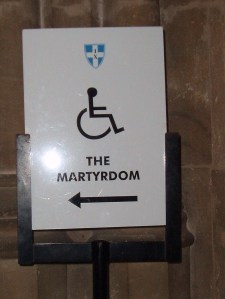I’ve been enjoying Chad’s blog, and social media shout outs for a while now; so I was quite excited, when this busy guy agreed to guest post here. It’s a joy for me to share things with readers here, including people.

Chad is a legend. Even “Biblical Learning Blog” (at http://www.biblecollege.org) included his blog, Captain’s Blog, in their list of Top 50 Ecumenical Blogs. So, it’s really an honor to have him here.
When I asked if he would be a guest blogger, Chad mentioned that wanted to share his heart, and I hope you soak in his contribution.
Leave your comments, afterwards, and show him what a polite readership I am fortunate enough to have by visiting his site, and to say “thank you.”
Chad, Thank you!
I Want You to Want Me
-Chad Estes
What we learned on the schoolyard playground seems to hold true in life. Those with the mad skills are the ones in demand. Those who can’t keep their eye on the ball, or catch an easy pop fly are picked to play right field and bat at the end of the order. This peer rejection is like the sting of a wasp, and unless you get off the field, you will probably get hurt by the same stinger, over and over again.
Adults play this same game. We want to team up with those people who benefit us, and help us win. We do this in business and in social circles. We even do this in church. Those on the outside of our margins–because of divorce, financial status, education levels, or addictive behavior issues, maynot be the first ones invited to our home fellowships. It isn’t their children that we invite to spend the night with our children.
But actually my thoughts about rejection aren’t about being picked last; it is the rejection that comes from being picked first.
What?
Yes, there is also a rejection issue with being picked first on a team because, more often than not, you are being picked for what you can do instead of who you are.
This is acceptable as long as you can keep up with the performance levels, but if your stats ever start to stumble, so will your value to the team.
It would be nice if this didn’t happen in Christian circles but unfortunately, it does.
Many churches and ministries recruit to a position based on a person’s perceived contribution value (Do they have good speaking skills? Can they lead a team? Do they agree with my direction? Will they serve this vision?) like it was written on stone tablets. But, when recruiting is all based on performance there will be a day when those skills will slip, or someone, even more qualified will come along. And when our positions are challenged, we may resort to some sort of spiritual steroids to help keep us on the field of play. The bad thing is these unnatural growth hormones actually stunt spiritual development It’s a cheap trick.
Today, I had a meeting where I was being recruited because of my ministry skills. But, as I drove home, I realized I was actually feeling the sting of rejection even though I’d been offered a position. The recruiter wasn’t really interested in me as much as she was interested in what I could do for her. She doesn’t really know me, nor does she know my heart. And unfortunately with her priorities all about her vision, she never will take the time to know what my heart is about. And so though it is a heady offer, it is a path that leads to performing, pretending, and pain.
My real value is my heart, not my skills. The skills are deteriorating with age. My heart is in the process of being renewed.
What I really want out of this life is to be picked by someone to be on their team, or be their friend not, because I’m a good player, or that I fit a niche, but simply because they want to be with me.
How about you?
- Which rejection hurts you more—the kind from not being included, or the kind from being selected for performance-based reasons?
- What do you suggest are ways to build relationships outside of these judgments and expectations?



